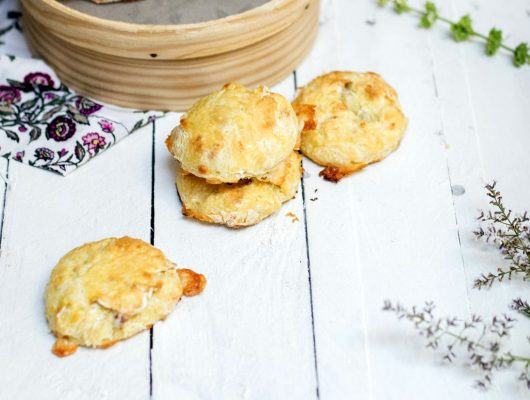Estes bolinhos de queijo são uma espécie de scones salgados, perfeitos para um lanche rápido ou para acompanhar uma sopa. Fofos por dentro e dourados por fora, são incrivelmente fáceis de fazer e desaparecem num instante. O queijo curado dá-lhes um sabor intenso e delicioso que agrada a miúdos e graúdos.
Ingredientes
- 300g de farinha para bolos
- 1 pitada de sal
- 50g de manteiga
- 20g de açúcar branco
- 120 ml de leite
- 1 c.chá de fermento em pó
- 2 ovos
- 100 g de queijo curado ralado (usei o nº1)
Preparação
- Pré aqueça o forno a 220ºC.
- Num taça junte os ingredientes líquidos: o leite e um dos ovos.
- Noutra taça acrescente todos os restantes ingredientes (à exceção do outro ovo).
- Esta massa deverá ser amassada apenas o suficiente para unir os ingredientes e para que não fique dura.
- Com os dedos una os ingredientes secos, apertando a manteiga para que esta se vá desfazendo.
- Junte os produtos líquidos e misture apenas o suficiente para que a masse fique coesa. Pode ser necessário juntar um pouco mais de farinha, dependendo do tamanho dos ovos.
- Disponha a massa numa superfície enfarinhada. Molde-a brevemente com a ajuda das mãos, para que fique com uns 6 cm de altura.
- Use uma taça, chávena ou molde para cortar pequenos círculos da massa.
- Coloque os pãezinhos num tabuleiro forrado com papel vegetal.
- Bata o ovo que resta e pincele os pãezinhos.
- Leve ao forno durante 15 a 20 minutos ou até que fiquem bem douradinhos. Sirva de imediato ou mornos.
Fancy a savoury treat that’s part scone, part biscuit, and all cheese? Here is the English version of this wonderfully simple recipe.
Cheese Scones (Bolinhos de Queijo)
These delightful “bolinhos de queijo” are best described as fluffy, savoury cheese scones[6][8]. Unlike the more famous Brazilian *Pão de Queijo*, which is a chewy ball made with tapioca flour, this recipe creates a light, tender, biscuit-like bake, perfect for enjoying warm from the oven. They are incredibly simple to whip up, requiring minimal kneading to achieve a wonderfully soft texture[4][10].
The key to a perfect scone is a light touch. The recipe rightly advises mixing the dough just enough to bring it together, as overworking it can make the final bake tough[7][10]. These scones are fantastic on their own, but they also make a wonderful accompaniment to a hearty soup or a stew. They are best served warm, split in half, and slathered with a generous amount of butter[6].
Feel free to get creative with this recipe. You could add some finely chopped chives or a pinch of cayenne pepper to the dry ingredients for an extra layer of flavour[8][9]. Any good, strong, hard cheese will work beautifully, so feel free to use a mature cheddar, Red Leicester, or even a nutty Gruyère instead of the Portuguese cured cheese[9].
Ingredients
- 300g plain flour
- 1 pinch of salt
- 50g butter, cold and cubed
- 20g caster sugar
- 120 ml milk
- 1 tsp baking powder
- 2 eggs
- 100g grated mature cheese[9]
Method
- Preheat the oven to 220°C (200°C Fan / Gas Mark 7)[9].
- In a jug, mix the liquid ingredients: the milk and one of the eggs.
- In a separate large bowl, combine all the other ingredients (except for the second egg).
- Using your fingertips, rub the butter into the flour mixture until it resembles breadcrumbs[8]. Then, stir in the cheese.
- Add the liquid ingredients to the dry ingredients and mix gently with a knife or your hands until it just comes together to form a soft dough[10]. Be careful not to overwork it. If the dough is too sticky, add a little more flour.
- Tip the dough out onto a lightly floured surface. Gently bring it together and pat it down until it is about 2-3cm thick[10].
- Use a round cutter (or the rim of a glass) to cut out circles from the dough[6][8].
- Place the scones on a baking tray lined with baking paper.
- Beat the remaining egg and use it to brush the tops of the scones (this is called an egg wash)[9].
- Bake for 15 to 20 minutes, or until they have risen and are golden brown[7]. Serve immediately or while still warm.
